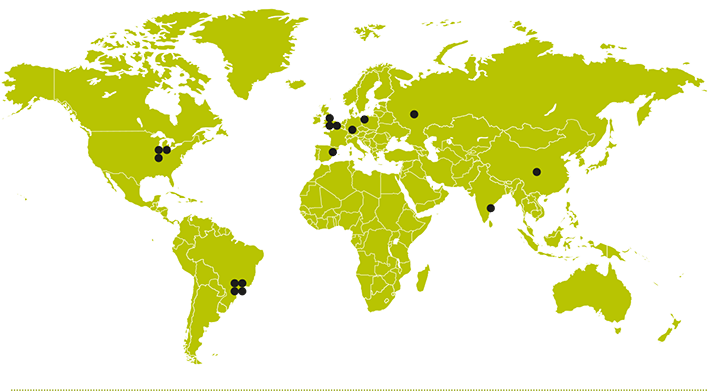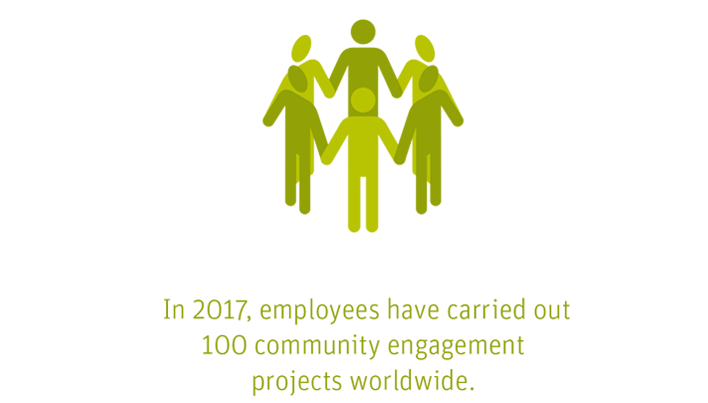Corporate Responsibility
2017 marks the starting point for a new chapter in Autoneum’s Corporate Responsibility management. The implementation of a Group-wide function in the first half of the year ensures that all relevant activities of the Company are advanced in a systematic manner and are subject to regular performance reviews. This is also reflected in the Corporate Responsibility Report 2016 which was published in 2017 for the first time in accordance with the requirements of the Global Reporting Initiative (GRI), the leading global standard in sustainability reporting. In 2017, Autoneum also developed its Corporate Responsibility Strategy 2025, which sets comprehensive environmental, social and compliance targets to be applied across the entire Group. Starting in 2018, these objectives will be gradually implemented at all company locations.

Eco-efficient production processes
Autoneum is working continuously to reduce its environmental impact by investing in eco-efficient processes. The initiative “Improve Sustainability” was created in 2015 to support these efforts. Its objectives are to reduce landfill waste, to recycle production waste and to reduce energy and water consumption at the Company’s production sites. During 2017, twelve production sites implemented a total of 16 eco-efficiency projects as part of this initiative. An energy monitoring system was introduced at the plants in Chongqing, China, and Chennai, India, leading to significant reductions in electricity consumption. The transition to LED lighting at the sites in São Paulo, Brazil, and Valldoreix, Spain, likewise enabled significant energy savings. In addition to energy efficiency measures, Autoneum is endeavoring to create closed material loops where raw and other materials used during the production process are completely recycled. To that end, the Company has further expanded its recycling and reclaiming capacities in 2017. In Oregon, Ohio (USA), scrap from the production of Ultra-Light ECO+ and Prime-Light components is now being recycled. The Gundernhausen plant in Germany has been recycling polyester used for Ultra-Silent parts since 2017: Scrap is converted to granulate and finally reused in the production process as basic material.

- 16 eco-efficiency projects worldwide
Occupational health and safety
As a manufacturing company, employee health and safety is of critical importance for Autoneum. The Company has committed itself to providing and maintaining a safe and healthy work environment for employees as well as customers, suppliers and visitors to company sites. In 2017, Group-wide initiatives were implemented in the areas of occupational health and safety, such as the creation of an ergonomics program and the development of an e-learning training program with 20 new learning modules on these topics. In addition, training programs that are already in place, such as the development program for managers on the topic of “behavior-based safety” and the “SafeStart” program for production employees, will be continued.
Employee development
Employees are Autoneum’s most important asset. An engaged, motivated and culturally diverse workforce is essential for the Company’s sustained business success. During 2017, the results of the employee satisfaction survey that has been conducted during the previous year were analyzed in site-specific focus groups, potential for development was defined and relevant measures were undertaken. Last year, Autoneum once again made significant investments in employee development. This includes the “High Performance Leadership” program where Autoneum’s corporate values and its High Performance Culture are conveyed to managers. Twenty employees from all regions took part in this training in 2017. Furthermore, 40 plant managers and teams from 19 countries were trained in motivation and coaching techniques as part of the “Engage Your Team” program.
Compliance
Autoneum aims to act in an exemplary and ethical manner both within Company boundaries as well as in all business relations. The Company complies with legal requirements and sets the highest ethical standards as its benchmark. In 2017, Autoneum expanded its compliance policy framework with cyber crime and information security elements and adopted corresponding guidelines. In addition, and in order to further enhance employee awareness, the training and
e-learning programs on cyber security, anti-corruption measures and fair competitive practices as well as on the Code of Conduct and the Speak Up Line, a confidential reporting channel, were expanded.
Social engagement
Autoneum has a significant economic impact on the communities surrounding its sites, in the form of employment, tax and infrastructure investment. At the same time, the Company builds lasting ties with local stakeholders in order to understand their needs and to support them with targeted engagement programs. To that end, every Autoneum site is required to engage in at least one community project a year. In 2017, around 100 initiatives were implemented worldwide. In addition, with its participation in the Bookbridge program, Autoneum launched its first global philanthropy project in 2017. The objective of Bookbridge is to establish financially independent learning centers in developing countries. In the reporting year, Autoneum employees supported the conception and development of learning centers in Cambodia and Mongolia within a six-month part-time program. The project contributes to the creation of new jobs, which in turn enhance the economic development of the community.

